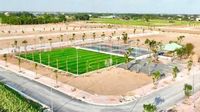The Vietnamese real estate market is poised for significant growth over the next decade, despite not yet experiencing a full-blown boom. According to a report by the Dat Xanh Services Institute of Economics - Finance - Real Estate Research, new real estate supply in the first quarter of 2025 surged by over 200% compared to the same period in 2024, though it saw a sharp decline of 60% compared to the fourth quarter of 2024.
Interest in real estate searches also saw a remarkable increase of 81% in Q1 2025, with interest points rising from 55 to 100 on January 1, 2025. However, the overall absorption rate fell by 13 percentage points, indicating a market in a state of compression, eagerly awaiting the right conditions to decompress.
While 2024 saw Northern projects dominating the market, the first quarter of 2025 marked a significant uptick in projects in the South, helping to balance supply across regions. Unlike the quiet of the previous year, Q1 2025 was marked by a flurry of preparatory activities from investors, including meetings with agents and promotional events for new projects. These activities signal a readiness to launch sales in 2025.
Dat Xanh Services projects that if there are no unusual impacts, a significant supply explosion is expected from Q2 2025 as investors prepare to introduce new products to the market. In Ho Chi Minh City, a notable increase in projects along Ring Road 4 is anticipated, driven by an increasingly developed transportation infrastructure that reflects the emerging trend of multi-centered urban development.
In the South, new supply is expected from several projects, including Eco Retreat, The Privé, The Global City high-rise, The Gió Riverside, Vinhomes Green City, An Huy residential area, The Felix, along with legally completed projects like La Home, King Hill Residences, and Agora City in Long An, which together represent over 50% of the new supply basket for Q2 2025.
Dat Xanh Services predicts that primary supply in Q2 2025 will increase sharply by 90% compared to Q1 2025, adding approximately 14,000 new products and bringing the total accumulated primary supply to nearly 52,000 products. Projects in the North are expected to account for about 29% of the basket for Q2 2025.
Looking ahead, Dat Xanh Services – FER identifies six main trends for the real estate market in Q2 2025, which will follow three growth scenarios. The first scenario envisions a macroeconomic context where U.S. tax policies will have wide-reaching effects on many economies, influencing investment decisions both domestically and internationally, thus impacting the speed of economic development and the recovery of the real estate sector.
The second scenario suggests ongoing cooperation, mergers and acquisitions, and restructuring of investment portfolios, which will create more collaborative opportunities. However, foreign direct investment (FDI) might face short-term disruptions due to U.S. policy changes.
The third scenario highlights that the industrial real estate sector will be significantly affected by President Trump’s tax policies, which are expected to impact global supply chains. Vietnam is seen as an ideal destination for investment, particularly in manufacturing, which will influence the demand for production space and logistics, thereby affecting plans for new industrial park projects by investors.
Commercial real estate is anticipated to be less affected, although some companies may downsize or exit the market, potentially leading to a short-term drop in demand. Retail spaces are expected to remain relatively stable due to ongoing growth in domestic consumption.
In the housing sector, a positive shift is expected in Q2 2025, with fierce competition among major players across various markets and segments. However, macroeconomic challenges may still impact investment flows and housing demand in the short to medium term.
Finally, the integration of technology in real estate is becoming increasingly prominent, especially with the application of AI platforms that enhance operational efficiency and facilitate quicker, more accurate decision-making. The experts from Dat Xanh Services – FER express optimism, stating, "The real estate market, instead of being overly excited about the new cycle, is transitioning into a calm state of observation and waiting. Nevertheless, since the market has been compressed for quite some time, the motivation to decompress is real, and we remain hopeful for increasingly positive improvements in the Vietnamese real estate market."
Meanwhile, at the CICON Vietnam 2025 Conference, Mr. Choi Min Ho, Mayor of Sejong City in Korea, shared insights on Korea's rapid transformation over the past 60 years from a poor, aid-dependent nation to a member of the expanded G7, excelling in various industrial and technological sectors. Cities like Seoul, Busan, Incheon, and especially Sejong have undergone rapid urbanization, but this growth has brought inevitable consequences, including environmental pollution and cramped living conditions.
To tackle these issues, Sejong's government is planning the entire city as an urban garden, where technology, ecology, and humanity intersect, featuring a green and convenient transportation system. Sejong is heavily investing in AI technology to develop a comprehensive smart city model that not only analyzes and predicts urban challenges like traffic and environmental issues but also optimizes the operations of urban complexes.
Mr. Choi Min Ho and other Korean experts suggest that cities in Vietnam, particularly Hanoi, could implement AI to manage traffic and mitigate pollution. To achieve this, Vietnam needs to actively attract foreign investment projects to promote technology transfer and develop green real estate projects.
Data from the Ministry of Construction indicates that Vietnam is gradually increasing the number of new real estate projects with green elements. Over the past year, there has been a notable rise in the number of real estate projects certified by LEED (Leadership in Energy and Environmental Design), an international standard for green buildings.
A report from CBRE Vietnam highlights the growing popularity of green real estate projects, which not only provide environmental benefits but also long-term economic advantages. Green buildings can save 20-30% on annual operating costs through efficient energy use, reduced water waste, and lower maintenance costs. According to Savills Vietnam, buildings that meet international green standards like LEED often command rental prices 10-20% higher than conventional buildings.
The Ministry of Construction has established technical standards for green housing and encourages the adoption of green technologies and recycled materials in construction. Additionally, the government has created tax incentives and credit mechanisms to support investors in developing green real estate projects.
As urban land in major cities becomes increasingly scarce, a growing desire for green living spaces that emphasize sustainability has sparked a wave of migration to satellite cities such as Bac Ninh, Hung Yen, Vinh Phuc, Ha Nam, and Hoa Binh, where there is still ample land for large-scale projects that prioritize green elements and high-quality amenities.


